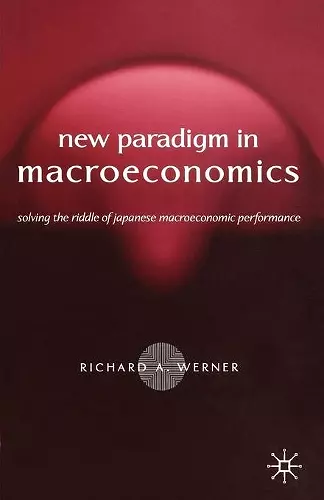New Paradigm in Macroeconomics
Solving the Riddle of Japanese Macroeconomic Performance
Format:Paperback
Publisher:Palgrave USA
Published:24th Mar '05
Should be back in stock very soon

Modern mainstream economics is attracting an increasing number of critics of its high degree of abstraction and lack of relevance to economic reality. Economists are calling for a better reflection of the reality of imperfect information, the role of banks and credit markets, the mechanisms of economic growth, the role of institutions and the possibility that markets may not clear. While it is one thing to find flaws in current mainstream economics, it is another to offer an alternative paradigm which, can explain as much as the old, but can also account for the many 'anomalies'. That is what this book attempts. Since one of the biggest empirical challenges to the 'old' paradigm has been raised by the second largest economy in the world - Japan - this book puts the proposed 'new paradigm' to the severe test of the Japanese macroeconomic reality.
'Richard Werner's exploration of the reasons for Japan's long stagnation is simultaneously stimulating and controversial. His study will take the reader on an exciting and well-written detective story to discover the underlying reasons for Japan's asset boom and subsequent long-drawn-out bust. Whether readers will agree with him, or not, they will be forced, by the power of his analysis, to reconsider and to reconfigure their own preconceptions. It is both a powerful and important book, which challenges both much received wisdom and the role of the Bank of Japan.' - Charles A. E. Goodhart, Norman Sosnow Professor of Banking and Finance, London School of Economics and Political Science, University of London
'an ambitious attempt to shape the terms of the economic debate over Japan's decade-long post-bubble economic stagnation.' - William Grimes, Boston University
'What a wonderful read! It must have been exciting to solve the puzzles, and Werner does a very good job in letting the reader share in the excitement of this intellectual quest. Werner develops a simple and elegant model based on empirical observations but sufficiently abstract, and one that stands up to empirical testing impressively well. The potential implications are huge. His findings have become influential with those interested in the real world of (Japanese) finance.' - Dirk Bezemer, Imperial College, University of London
'Werner has done an excellent job of showing the difficulties and conundrums faced by neoclassical theory when confronted with Japan's recent (and older) performance. He demonstrates a scholarly and deep knowledge of the Japanese economy, while maintaining a light touch. Werner's analysis of banking and credit-money creation, in particular, offers new insights into the enigmas of Japanese capitalism. This is a book that will be read by many more than Japan specialists.' - Costas Lapavitsas, SOAS, University of London
'Lucid in presentation, trenchant in critique, Richard Werner has stamped on orthodox neo-classical interpretations of the Japanese economy and joined a group of apostates demanding a new paradigm for the dismal science. The intellectual rigour with which he marshals the evidence to explain the riddle of Japanese macroeconomic performance is impressive. Whilst his focus on the role of the Bank of Japan in the supply of money and credit as his key explanatory variable is bound to spark controversy, for all those interested in the actual workings of the Japanese economy his empirically rich and theoretically robust analysis will prove stimulating and refreshing. It should be read by all students of the Japanese economy and political economy more generally.' - Glenn D. Hook, Professor of Japanese Studies and Director of the Graduate School of East Asian Studies, University of Sheffield, UK
'Werner's exploration of the reasons for Japan's long stagnation is simultaneously stimulating and controversial. His study will take the reader on an exciting and well-written detective story to discover the underlying reasons for Japan's asset boom and subsequent long-drawn-out bust...It is both a powerful and important book, which challenges both much received wisdom and the role of the Bank of Japan.' - Charles A. E. Goodhart, London School of Economics and Political Science, UK
'an ambitious attempt to shape the terms of the economic debate over Japan's decade-long post-bubble economic stagnation.' - William Grimes, Boston University, USA
'What a wonderful read!...Werner develops a simple and elegant model based on empirical observations but sufficiently abstract, and one that stands up to empirical testing impressively well. The potential implications are huge. His findings have become influential with those interested in the real world of (Japanese) finance.' - Dirk Bezemer, Imperial College, University of London, UK
'Werner has done an excellent job of showing the difficulties and conundrums faced by neoclassical theory when confronted with Japan's recent (and older) performance...Werner's analysis of banking and credit-money creation, in particular, offers new insights into the enigmas of Japanese capitalism. This is a book that will be read by many more than Japan specialists.' - Costas Lapavitsas, SOAS, University of London, UK
'A must-read for economists and finance professionals. It will revolutionise economics.' -Tobias Hoschka, Head of Asian Research, McKinsey & Company
ISBN: 9781403920744
Dimensions: unknown
Weight: unknown
423 pages
2005 ed.